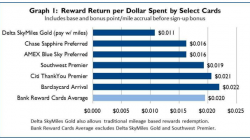Back in February, a US Tax Court decision touched on the world of credit card rewards and manufactured spend. In Anikeev v. Commissioner, the IRS attempted to argue that purchasing gift cards and money orders with rewards points made the points taxable. While it seems the IRS targets credit card rewards here, the Tax Court pushed back. Ultimately, the court held that direct purchases of money orders/debit cards were problematic; however, purchases of gift cards later used for something else weren’t. Nevertheless, the court’s reasoning provides some concern for future issues.
The History of Tax Issues of Credit Card Rewards
In early 2019, I provided a brief history of the history of the IRS position on credit card rewards. The short answer – the IRS really hasn’t provided a firm position on the matter, contrary to popular belief. Instead, Announcement 2002-18 merely says they won’t pursue enforcement related to receipt of points earned on business travel. For that matter, IRS policy has been to treat the receipt of reward points as nontaxable in most cases. That recently changed with respect to points earned for opening a bank account or referral bonuses.
As a tax practitioner, this type of thing makes me nervous. IRS “policy”, without an actual administrative ruling like a Revenue Ruling, can change as facts on the ground change. That shoe sort of dropped in Anikeev, admittedly a particularly extreme case.
IRS Targets Credit Card Rewards in Particularly Egregious Case
A good rule of thumb I tell clients is, “don’t get too greedy”. Smart tax planning often pushes the envelope, but discretion is often the better part of valor. The Anikeev family clearly didn’t take that advice, though. In the case, the IRS asserted deficiencies on the couple’s 2013 and 2014 tax returns of $9,928 and $93,845, respectively. This was the result of the IRS valuing credit card rewards earned at $36,200 and $277,275, respectively. (Yes, it typically really does take that long for an audit to proceed through Tax Court.) The Anikeev’s scheme? They earned AMEX Blue Cash Rewards by buying Visa gift cards, reloadable debit cards, and money orders. In some cases, the couple also used those gift cards to then purchase debit cards and money orders.
And it’s not a trivial amount of manufactured spend we’re talking about, either. (Note that throughout, “petitioner” refers to the Anikeevs, and “respondent” to the IRS.)
In 2013 petitioners’ charges on the 1005 Card totaled $1,219,077. Of this amount, $1,208,376 was for charges of more than $400 in single transactions for Visa gift cards, reloadable debit cards, and money orders. Accordingly, over 99% of the charges on the 1005 Card during 2013 were for Visa gift cards, reloadable debit cards, and money orders. Petitioners made $10,702 in purchases during 2013 that were not for Visa gift cards, reloadable debit cards, or money orders. In 2014 petitioners made charges totaling $5,184,033 on their American Express cards for Visa gift cards, reloadable debit cards, and money orders.
Ultimately, the manufactured spend scheme yielded $36,200 in Blue Cash rewards in 2013 and $277,275 in 2014. The IRS valued the Blue Cash points earned at face value. The reason? The IRS took the position that using the points for Visa gift cards, etc. made them cash equivalents. Interestingly, the IRS indicated that it does indeed regard rewards points generally as a rebate on a product or service.
At the outset of the trial of this case, respondent’s counsel said: “And it’s a long-standing IRS policy, Mr. Sklarz is right, long-standing IRS policy is that card rewards are not taxable. And the rationale for that is that the reward itself acts as a discount on whatever property or services are being purchased by the consumer.”
In plain English, a rebate that reduces your cost of whatever it is you obtain. However, the IRS’ position is that this applies only if you use the points to purchase goods or services. Use the points to obtain cash, and you’re on the hook for income.
As far as the “they got too greedy” bit, well, read what the Tax Court has to say about the scheme:
Petitioners clearly acquired economic benefits by cleverly and relentlessly manipulating the Rewards Program. Their actions never offended American Express and had Mr. Anikeev not been so successful in his efforts he likely would have been ignored by the IRS.
Tax Court Mostly Swats Down IRS, But Trouble Possibly Brewing
To simply summarize the competing arguments, the Anikeevs argued that gift cards constitute a “product”, and thus, the rebate concept applies. The IRS, meanwhile, focused on the end use of the gift cards, the purchase of money orders or debit cards. On the issue of rewards earned from gift card purchases, the court agreed with the taxpayer. The Tax Court focused on the gift cards’ lack of cash value, and that the convenience of providing a credit card substitute for which you pay a fee makes it a “service” rendered by purchasing a “product”. As such, the court flatly rejected the IRS’ “cash equivalent” argument; it ruled that rewards earned from purchasing gift cards do not constitute taxable income.
On the other hand, the Tax Court did find issues with direct purchases of debit cards and money orders. Here, the court noted that “no product or service is obtained” in these cases; rather, the only value obtained is a cash transfer. Thus, the court ruled that since the taxpayers purchased no product or service, it’s impossible to reconcile with existing IRS policy. In other words, it’s impossible to have a “rebate” where you don’t actually purchase something. All that said, the court had some rather choice words for the IRS using litigation to overturn its own policy:
We note that the above holdings are not based upon the application of the cash equivalence doctrine but rather the incompatibility of the direct money order purchases and the debit card reloads with the IRS policy excluding credit card rewards for product and service purchases from income. These holdings are based on the unique circumstances of this case. We hope that respondent polices the IRS policy in the future in regulations or public pronouncements rather than relying on piecemeal litigation.
Sounds great, right? The Tax Court refused to tax rewards earned on even absurd levels of manufactured spend. As long as it involves gift card purchases, of course. And it told the IRS to stop coming to the courts to change its policy to boot. But the court did leave open an avenue I find concerning for the future.
A Back Door Method to Taxing Rewards from Gift Cards
Interestingly, prior to trial, the IRS offered an alternative theory to taxing the rewards. Namely, by taking the “rebate” theory to its logical conclusion through the concept of “basis”. In tax parlance, “basis” refers to the price you pay for purchasing a product. So if you pay $500 for a gift card, your basis in that gift card is $500. If you later sell the gift card for more than your basis, you realize taxable income.
How does the “rebate” theory come into play? Let’s say you buy a $500 gift card at a supermarket with your AMEX Gold Card, earning 2,000 MR points. Then say you pay a $5 fee to activate it, earning an additional 20 points. If you value MR points at 1.5 cents/point, you received a rebate of $30.30, leaving you with a basis of $474.70. Then, if you use the gift card to purchase a money order for $500, you realize a gain of $25.30 on the exchange. Apparently, the IRS offered this alternative theory before trial, but abandoned it for some reason. Perhaps they decided the minimal income per transaction didn’t add up to enough in the aggregate to matter. But the Tax Court certainly seemed open to such an interpretation.
As stated previously, respondent has not argued that petitioners must recognize gain on the exchange of the gift cards. Theoretically, on the basis of established precedent, the Reward Dollars reduced petitioners’ bases in the Visa gift cards that they purchased, and petitioners generated proceeds when they converted the cards to money orders. To the extent the rebates exceeded the fees charged to acquire the gift cards, it seems that gain was generated similar to the gain that a purchaser of the rebated automobile would generate if the vehicle was sold for more than the purchase price reduced by the rebate. Thus, it would appear that the taxable event would not be the receipt of Reward Dollars upon the purchase of their Visa gift cards but the transformation of the cards into cash equivalents that could be deposited in a bank account.
Now, on an individual transaction basis, this doesn’t matter much. In the simple example above, your tax cost for $500 in MS is somewhere between $3 and $9. Netting that and the $5 fee still leaves you ahead if you’re earning 4x bonus spend. Worst case, you buy $30.30 of MR points for about $14.
What concerns me, though, is what happens with everyday uses of points if the IRS aggressively pursues this theory. What if, for example, you transfer 55,000 MR points to Virgin Atlantic, and then redeem them for a one-way ticket in ANA First Class? Pretend you earned those points from a “spend $5k, earn 50k points” promotion. You bought $5,000 worth of stuff, earning $825 of MR points. Could the IRS claim you exchanged stuff with a basis of $4,175 for a one-way F fare worth $7,500?
Admittedly, the above represents an absurd example. I doubt trying to extract a few bucks of tax on a typical transaction ranks as an IRS priority. But if they get a whiff that manufactured spend generates significant “abusive” situations? It’s possible they issue an administrative ruling curtailing the “rebate” treatment in certain circumstances.
Final Thougts
Though the IRS targeted credit card rewards in a particularly extreme case, the good news is the Tax Court largely sided with the taxpayer. Certainly, occasionally buying a gift card at Kroger seems unlikely to draw the IRS’ attention. But consider this a warning that particularly abusive situations are on the agency’s radar, apparently. Tread with caution, and it wouldn’t surprise me if some limits are forthcoming.
Cover photo: “IRS Key” by GotCredit, via Flickr Creative Commons, license Attribution 2.0 Generic.






